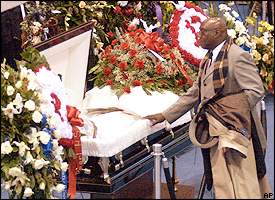NASHVILLE, Tenn. -- They laughed and cried in eulogizing Joe
Gilliam as a pioneer with an imperfect past.
Funeral services were held Friday for the former Pittsburgh
Steelers quarterback, who died of an apparent heart attack on
Christmas Day and was buried on his 50th birthday.
|  | | Jesse James pays respect to his former Tennessee State University teammate Joe W. Gilliam, Jr. at Friday's services in Kean Hall on the campus of TSU in Nashville. |
About 600 people crowded into Kean Hall at Tennessee State
University, his alma mater and where his father, Joe Gilliam Sr.,
spent most of his 40-year coaching career.
"Every black quarterback who is and ever will be rides on the
shoulders of Jefferson Street Joe," said state Rep. Thelma Harper,
prompting a standing ovation from the crowd.
Gilliam earned his nickname for a street that runs through the
campus of Tennessee State, where he was star.
In addition to his family, mourners included Steelers
quarterback Kordell Stewart and former running back Franco Harris,
Grambling coach Doug Williams, the first black quarterback to win a
Super Bowl, and Olympic long jumper Ralph Boston.
Gilliam's open casket was surrounded by generous arrangements of
roses, carnations and lilies, including one shaped like a football,
with "No. 17" in the center.
Gilliam was one of the first black quarterbacks in the NFL, and
started for the Steelers in 1974. But he spent much of his post-NFL
career battling drug addiction and living on streets.
The nearly two-hour ceremony was marked by laughter and tears,
as stories were told about Gilliam's life. His parents, wife,
siblings and three adult daughters sat on the front row, sometimes
dabbing tears.
His daughter, Joi Gipp, read a letter Gilliam recently sent to
publishers to encourage interest in his autobiography, "In Spite
of Myself."
"Throughout my life, I've had success in spite of myself," he
wrote. "A person can be raised in a good home and still make the
wrong life decisions."
He said the book would deal with his drug abuse, near-death
experiences and promiscuity.
"In spite of myself, the creator would not allow me to give up,
and in spite of myself, I persevered," he wrote.
The Rev. Edwin Sanders, who gave the eulogy, told Gilliam's
family and friends that they should find comfort in the way Gilliam
lived the last few years of his life.
"He had given his life to God," he said.
Gilliam was a promising young quarterback with a strong arm when
he was an 11th-round draft pick in 1972.
He earned a starting role for the Steelers in 1974, six years
after Marlin Briscoe of the Denver Broncos became pro football's
first black starting quarterback.
Gilliam became a starter when several veteran players, including
quarterback Terry Bradshaw, went on strike. Gilliam kept the job
when Bradshaw and the others returned, leading the Steelers to a
4-1-1 record.
Bradshaw, however, won the starting job back and was the
quarterback during the years the team was famed for its "Steel
Curtain" defense.
Gilliam played little during the 1975 season, then was cut. In
1976, he played briefly with the New Orleans Saints before being
dismissed for breaking team rules.
His subsequent addiction to cocaine and heroin left him at times
homeless, broke and in and out of rehab centers. As recently as
1995, he was living on Nashville's streets and in rooming houses,
and he pawned two Super Bowl rings to make ends meet.
His father later got the rings back through fans and friends,
but was waiting for the right time to return them to Gilliam.
During the past three years, Gilliam seemed to have turned his
life around. He opened a football camp for teens at Tennessee State
last summer and counseled other drug addicts. He said he had been
sober for three years.
| |
|


